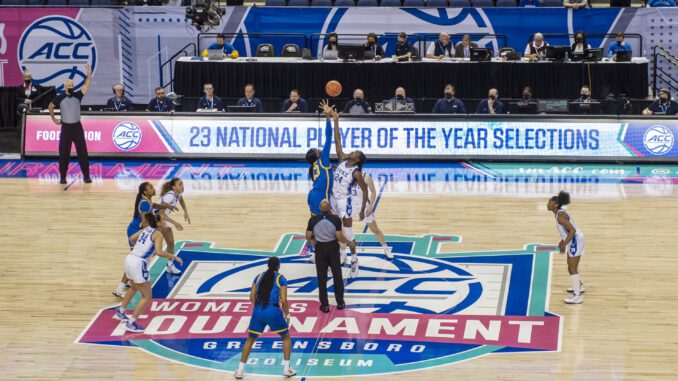
The ACC was born in Greensboro in 1953 and still lives in its hometown. That may not be the case for much longer, however.
New commissioner Jim Phillips turned heads and generated more than his share of bad will around North Carolina when he admitted that the conference was exploring the possibility of moving its headquarters out of Greensboro.
The state of North Carolina has always been the center of the ACC, both geographically and in spirit. However, as the conference has expanded, there have been questions about whether keeping the ACC so NC-centric is in the best interests of the league.
In 1953, the conference had seven (soon to be eight) teams spread from Maryland to South Carolina. Now, it stretches from Boston to Miami and as far west as Indiana and Kentucky. Instead of supplying half of the conference’s teams, the four North Carolina ACC schools now constitute just over a quarter of the membership. There are as many schools to the south (four) and north of the Mason-Dixon Line as there are in North Carolina.
That doesn’t necessarily mean that a move is in order, just that the possibility should be studied. And as the new guy, coming in from Illinois, Phillips is willing to wear the black hat and be the one to make the call.
Commissioners of major sports leagues rarely enjoy popularity with the public. Just listen to Gary Bettman, Roger Goodell or Rob Manfred get introduced to a crowd. And one of the biggest changes since 1953 is that the ACC is now a major sports league. Its commissioner needs to make the best business decision for the league, and, as is often the case, that means selecting financial considerations over tradition.
Reportedly, Phillips’ criteria for finding the ACC’s home includes the following:
Be located within the Eastern Standard Time zone
Population size with positive growth trends
Access to a large hub airport with effective access to and from all ACC member schools
Anticipated benefit to the overall ACC brand
Financial considerations related to operational expenses
He later added in an interview with longtime ACC writer David Teel, “Should it be aligned with media opportunities? Should it be aligned with Fortune 100, 200, 500 companies? Should it be aligned with corporate sponsorship opportunities? Should it be aligned with a city that could host championships or does host championships?”
Only the staunchest Greensboro homer would argue that these are NOT all things that should be considered in the process. And, according to reports, the two cities expected to compete with Greensboro to land the headquarters, Charlotte and Orlando, both meet those criteria.
Charlotte is a fast-growing city — it’s added nearly half a Greensboro in population over the last 10 years — with a young, diverse population and an ever-growing number of successful companies. ESPN, arguably the ACC’s most important partner, has a large presence there, and the city has state-of-the-art facilities and has hosted championships in football, basketball and baseball in recent years, as well as conference media days.
Charlotte is also easily accessible from each of the cities that ACC schools call home. If you search flights from Boston or Miami to Charlotte, you get a wide variety of times and price points. One of the first results when searching Boston to Greensboro is a connecting flight — through Charlotte. A Miami to Greensboro search suggests that flying to Raleigh-Durham may be a better value.
Orlando, while located on the southern end of the conference’s footprint, also has its advantages. It’s also easily accessible from across the ACC. It has a history, albeit not as extensive, of hosting championship events and certainly has the infrastructure to do so in the future. ESPN also has a major presence in that city, since the network is owned by Disney — the recognizable face of Orlando. Florida also has well-known tax advantages, scoring highly for Phillips on the “operational expenses” bullet point.
None of this is meant to throw shade on Greensboro, which has been an ideal home for the league and host for most of the ACC Tournaments. It’s just that the conference has grown, from North Carolina’s special gem to one of the top entities in the college sports landscape.
That doesn’t mean it has to move. The SEC’s home since 1948 has been Birmingham, Alabama, a city that’s smaller than Greensboro and not growing as fast. That league seems to be doing just fine staying close to its traditional roots.
Still, it may be time for the ACC to consider moving out of its childhood home and finding something bigger. It’s at least worth looking into it and seeing what’s out there. The ACC will be better for going through the process. And if Phillips ultimately decides to stay in Greensboro, it should be the result of a business decision, not an emotional one.
Failing to do so, while undoubtedly more popular in the short run, is a mistake.



